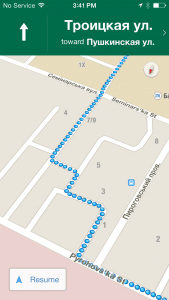After settling in with a host family in Ukraine, I’ve looked back on my notes from my first couple of weeks abroad and come to a realization – in a lot of ways, Abroad-Olivia is a child, just a little bit bigger. I’ve compiled these notes to make a list of seven reasons why living abroad is like a second childhood.
1. You’re not entirely trusted to navigate places on your own.
Your first bus ride to school all by yourself is a big deal and getting home is an accomplishment. You’ve got a map with you just in case and double-checked the name of your stop with your host sister. When you get home without getting totally lost, your host mom is incredibly proud of you.
2. Stranger danger is something you should worry about.

You’ve met your next-door neighbor four or five times already, but he still scolds you for answering the door for him when nobody is home. “Never open the door when you’re home alone! It’s dangerous! Don’t open the door! Understood?”
3. Everything is new and interesting.
You end up asking a million questions and remind yourself of that three-year-old you babysat for awhile in high school. “Why does this van work like a bus? It’s just a normal van with some signs and numbers taped in the window, isn’t it?” Or, “Why do you cover your head in church?” “Why do so many people here wear uniforms for their jobs?” “Does your job have a uniform?” “Do you think if I stay here, eventually I can get a uniform too?” After a few days of this sort of thing, you may earn yourself a new name around your host-home: “почемучка,” which means “question asker” or “why-person” and is commonly applied to children.
4. Sweet!
My thought process usually goes something like this: “Look, these Roshen chocolate thingies are made in Ukraine! Cool. I don’t have Ukrainian candy at home… I guess I should eat it.”
5. Sometimes you can’t communicate properly and that makes you fussy.
When the attendant at the corner shop can’t understand your request for that awesome-looking twisted scone thing, you resort to pointing and saying, “I want that… please.” That’s how tiny children ask for things. You’re about as eloquent as a toddler.
6. Most of the time, it’s other people’s job to feed you.

Your host mom cooks a lot, so you should probably stop buying candy on your school lunch break. Host mama’s orders to “Eat more! Eat, you’re so skinny!” will make you regret that halva (a dense, flaky, nut-based dessert, whose name means “sweet” in Arabic) or that Alyonka bar (Russia’s Hershey bar) that you had on the way home from school.
7. You’re constantly learning new words
… and sometimes people pat you on the back for using complex phrases. When I broke out my new favorite word, which also happens to be the longest word I know, “достопримечательность” (which is Russian for “attraction” or “landmark”), my host sister was so impressed, she pulled out more pryaniki (Eastern European spice cookies) from the bread drawer in congratulations. Cookies. What a fantastic reward for a big kid.
For better or for worse, abroad-childhood is even more fleeting than childhood was the first time around. You “grow up” much more quickly in terms of safety, public transportation, and constant questions, and just have to hope that your language skills will promptly follow.


